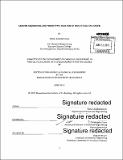Genome sequencing and phenotypic analysis of single cells in cancer
Author(s)
Adalsteinsson, Viktor Arnarson
DownloadFull printable version (20.15Mb)
Other Contributors
Massachusetts Institute of Technology. Department of Chemical Engineering.
Advisor
J. Christopher Love.
Terms of use
Metadata
Show full item recordAbstract
Relatively little is known about metastatic cancer. The vast majority of cancer genome profiling (~99%) is done on primary tumors; yet, metastatic cancer is attributed to >90% of cancer-related deaths. The underlying challenge is that metastatic cancer is difficult to sample: surgical resections are less common, metastatic biopsies are not part of clinical routine, and such invasive biopsies are not a repeated solution. In the first half of my thesis, I describe our advances in unlocking comprehensive sequencing of metastatic cancer from blood. We demonstrate that confident and powered sequencing of all genes in the human genome from single circulating tumor cells (CTCs) is both possible and useful clinically. We also describe a statistical framework for evaluating amplification bias in single-cell sequencing and two new methods for enriching CTCs from blood. In the second half of my thesis, I present our advances in characterizing the phenotypic behavior of single cells in cancer. We examine the polyfunctional heterogeneity in secretions of ELR+ CXC chemokines from single tumor and stromal cells and demonstrate how the true behavior of single cells can be hidden in bulk assays. We also describe assays to measure the growth kinetics of tens of thousands of single cells in parallel and to identify B cells that produce autologous antibodies against tumor-associated antigens. Together, these advances in genomic and phenotypic characterizations enable a deeper understanding of cancer that should help to develop and deploy more effective cancer therapies tailored to individual patients.
Description
Thesis: Ph. D., Massachusetts Institute of Technology, Department of Chemical Engineering, 2015. Cataloged from PDF version of thesis. Includes bibliographical references.
Date issued
2015Department
Massachusetts Institute of Technology. Department of Chemical EngineeringPublisher
Massachusetts Institute of Technology
Keywords
Chemical Engineering.